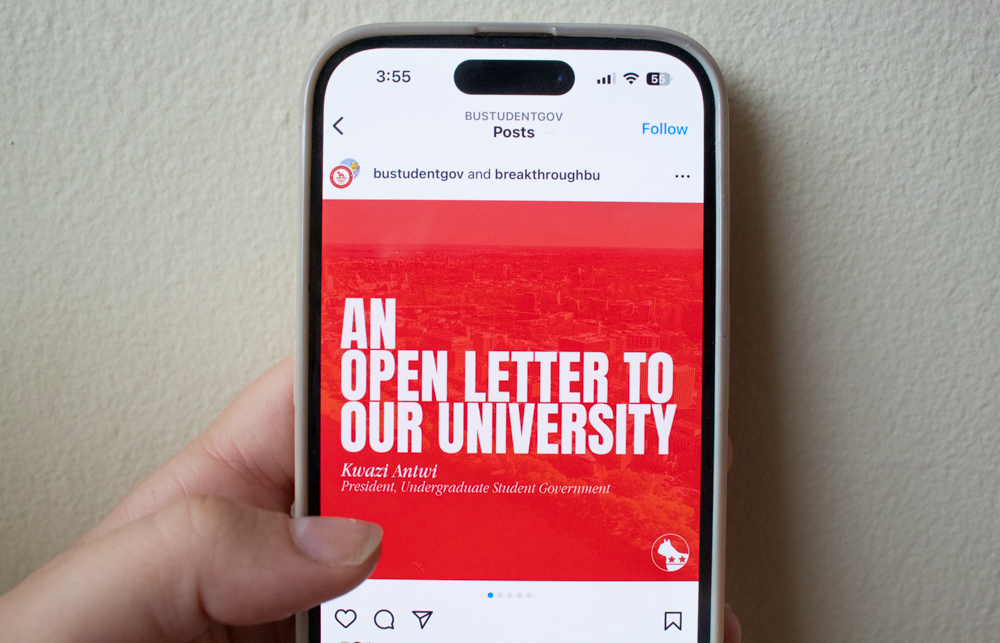Following Boston University’s 6% decrease in Black student enrollment, Student Government President Akwasi Antwi attempted to use the StuGov email platform to condemn this drop, but his efforts were shut down by the BU administration.

The email, which would have been sent to all undergraduate students, was blocked by the BU Marketing and Communications team for “[editorializing] the news of the decline in the Black student population” and for containing his personal opinion, Antwi said.
BU Spokesperson Colin Riley wrote in an email to The Daily Free Press that “broadcast emails are to share news/information about University business, events, and opportunities.”
Following MarCom’s response, Antwi sought StuGov’s support through an endorsement.
“[Instead] of it being a communication from the student body president, it would be an endorsed letter voted by the majority of the Student Government Senate,” Antwi said.
When Antwi presented his letter as a bill to the StuGov Senate during their Oct.7 meeting, it was approved with 36 votes.
Terriers United, a party within the StuGov Senate that seeks to “be reflective of students’ voices,” then made amendments to the letter. This ensured the letter expressed “an opinion that the student government, as a whole, would agree with,” said Jacob Aznavoorian, party leader of Terriers United.
When Antwi returned to BU Administration with the revised letter and the endorsement of the Student Government, the letter was once again struck down.
Antwi said the administration’s second rejection “hit a little bit hard” since past members of StuGov have used broadcast emails to speak out about University issues.
During the spring semester, former Student Body President Dhruv Kapadia sent a mass email in support of the BU ResLife and Graduate Workers Unions. Antwi said he followed the same procedures as Kapadia to get approval for his letter to be sent out.
“It made me think that it wasn’t necessarily about the procedure following the letter, but it was instead about the message contained in the letter,” Antwi said.
Antwi said he was then offered an “extremely stripped-down version of the letter,” which omitted many of the provisions he wanted to include, such as increasing Black student scholarships, hiring more Black professors and the “formation of a Black student research center.”
Antwi said he once again brought the new letter to MarCom and the Dean of Students, with revisions made by BU administration.
The letter was rejected again.
The University’s alternative was posting the letter in the BU Today Opinion and Editorial section.
“BU Today published the StuGov President’s letter in a POV, an appropriate place for thoughtful opinion pieces,” Riley wrote.
Riley wrote that prior to Antwi’s opinion piece, the BU Today had written an article about the new admissions data.
Antwi accepted MarCom’s offer to publish the stripped-down version of the letter in the Op-Ed section. StuGov also published the letter to its Instagram.
“At this point, I knew that what was going on was not necessarily just a procedural concern, but instead a considered effort by members of an administration to silence the issue of the decline of the Black student population,” Antwi said.
Aznavoorian said the decision to not publish the letter was “hypocritical.”
“What we’re asking for is just a dialogue and an open conversation,” Aznavoorian said. “We do want results, absolutely, but I think the main point of the letter was to open up a dialogue with the administration, which it seems they’re not really receptive to.”
Sean Sutton, a senator for the College of General Studies who voted to endorse the letter, said he could understand why the school made the decision to block the letter.
“As the school, you never want to really say what problems you have, at least publicly in the sense that your own student government is promoting it,” Sutton said. “I could see from that angle how that might lead them to say, ‘Well, we can’t allow this to go through.’”
Sutton said the decision to reject the letter, “justified or not,” was “the best decision the school could make to keep the reputation they wanted to promote.”
“[Antwi] finding other avenues that are for him to use to publicize a message that we [at StuGov] all do agree upon is the right thing to do,” Sutton said.
Antwi said a broadcast email containing his original message would have been more effective than the platforms he ultimately used, especially in terms of reaching students.
“[The] first thing that I wanted to do was to reach out to members of the Black community at the school and kind of reassure them,” Antwi said. “When you’re looking at these numbers, as a Black student, it’s hard to not feel like you don’t deserve to be here.”
Crystal Yormick contributed to the reporting of this article.




















































































































